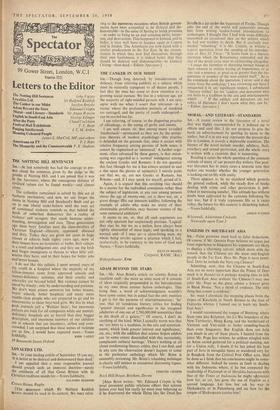ADAM BEYOND THE STARS
SIR,—Mr. Alan Brien's article on science fiction is excellent stuff—the more so since most of it consists of ideas originally propounded in the Introductions to my own three science fiction anthologies. This being thus, a word of acknowledgment wouldn't have come amiss; but in actual fact the only mention 1 get is for the purpose of misrepresentation; 'he' fine, that is) 'condemns literary critics for finding "greater interest and significance in the imagined adulteries of one out of 2,700,000,000 nonentities than in the death of a galaxy." ' Of course, I don't do anything of the kind. What I actually wrote was that we 'are heirs to a tradition;in the arts and entertain- ments, which finds greater interest and significance,' etc. etc.; with the addition that science fiction addicts are `to some extent dissatisfied, with this narcissistic, complacent cultural heritage.' There's nothing at all about condemning literary critics, that I can find; and in any case the observation doesn't happen to come in the particular anthology which Mr. Brien is ostensibly reviewing. Mr. Brien's rehashing technique is clearly still subject to occasional distressing lapses. --Yours faithfully, [Alan Brien writes : 'Mr. Edmund Crispin is the most persistent public relations officer that science fiction ever had but really he must stop behaving as if he discovered the whole Thing like the Dead Sea Scrolls in a jar under the basement of Foyles. Though only the end of the world will apparently prevent him from writing leaden-footed introductions to anthologies, I thought that 1 Intd.with some difficulty unearthed an occasional idea on the subject which he had not trodden to 'death. But if anybody ever needed "rehashing" it is Mr. Crispin, as witness a typical quotation from the opening of his introduc- tion of Best SF Three: "It harks back to a literary intention which the Renaissance outmoded and the rise of the novel came near to obliterating altogether —1 mean the intention of depicting human beings in their relation to entities having an importance, or at any rate a potency, as great as or greater than the im- portance or potency of the man animal itself." As to his complaint about the quotation, I never said it did come from the anthology I was reviewing nor have 1 miscploted it in any significant respect. I substituted "literary critics" for his "addicts and detractors who are heirs to a tradition in the arts and entertainments which . . ." if the addicts and detractors are not critics of literattire I don't know what they can be.' —Editor, Spectator.]


































 Previous page
Previous page